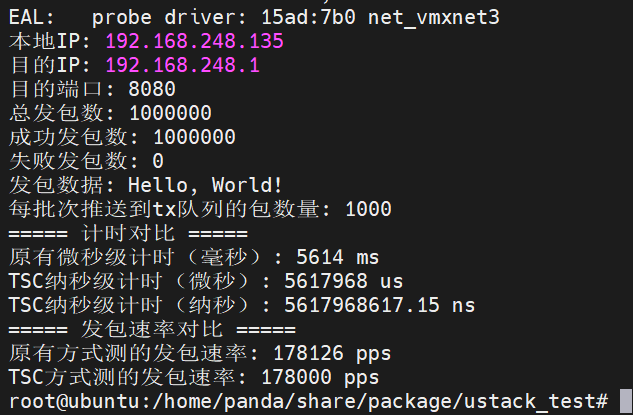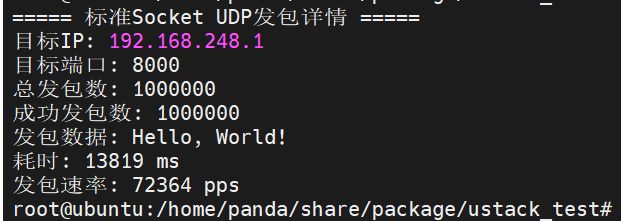注:该文用于个人学习记录和知识交流,如有不足,欢迎指点。
PPS 是 Packets Per Second 的缩写,中文意为每秒数据包数 ,是衡量网络设备或程序数据包处理能力的核心指标,具体指单位时间(1 秒)内成功发送或接收的数据包数量。
在本文中:pps:每秒发包的个数
一、发送100万个UDP包的测试结果
dpdk:
sudo ./build/ustack -l 0 -n 2 -- --sip 192.168.248.135 --sport 8080 --dmac 00:50:56:c0:00:08 --dip 192.168.248.1 --dport 8080 --count 1000000 --udp

每秒发包数为178126个左右
posix API:
./normal_udp_send_tool

每秒发包数位72364个左右
二、结果论述
pps对比:
- dpdk:178126
- posix AP:72364
- 前者大约是后者的2倍
三、原因
1、DPDK 发包的 "性能突破点"
DPDK 是专为高性能网络 设计的用户态框架,核心优势在于绕过内核协议栈,直接在用户空间完成数据包的构造、发送,从而消除了一系列内核级开销:
- 无内核上下文切换:传统 Socket 发送数据包时,需从用户态切换到内核态(系统调用开销),DPDK 完全在用户态操作,无此开销;
- 无内存拷贝:传统 Socket 需将用户空间数据拷贝到内核空间(再由内核发往网卡),DPDK 通过 "大页内存""mbuf 内存池" 等机制,实现用户空间直接向网卡硬件缓冲区写数据,避免多次内存拷贝;
- 批量操作优化 :DPDK 支持批量构造、批量发送 (如代码中的
BURST_SIZE),将多个数据包的开销 "摊薄",进一步提升效率; - 轮询式网卡驱动:DPDK 用 "轮询(Polling)" 代替传统网卡的 "中断" 模式,消除了中断处理的延迟和开销,适合高吞吐场景。
2、标准 UDP Socket 的 "性能瓶颈"
标准 Socket 基于内核协议栈实现,每一步操作都存在固有开销:
- 系统调用开销 :调用
sendto时,需从用户态切换到内核态,完成权限校验、参数解析等操作,单次调用虽快,但高频调用时开销显著; - 内核协议栈处理:内核需完成 UDP 封装、IP 封装、校验和计算等一系列协议逻辑,且这些操作是 "逐包串行" 的,无法像 DPDK 那样批量优化;
- 内存拷贝开销:用户空间数据需拷贝到内核空间,再由内核拷贝到网卡硬件缓冲区,两次拷贝带来额外耗时。
3、数据对比的直观结论
从测试结果看:
- DPDK 发包速率约 17.8 万 PPS;
- 标准 UDP Socket 发包速率约 7.2 万 PPS;
- 前者是后者的 2.4 倍以上,且随着发包量增大、数据包变小,这个差距会更明显(小包场景下,DPDK 的 "批量优化" 和 "无拷贝" 优势更突出)。
小包场景下优势更明显的原因:
- 大包和小包,内核拷贝的速率是差不多的,内核更多的消耗在于的是内核与用户态数据之间的交互(这个损耗的时间远大于拷贝数据大小的影响)。
- 而dpdk由于是无拷贝的,即没有与内核的数据交互,其将数据写到内存池所需的时间主要受拷贝数据大小的影响。
- 因此说,小包场景下,dpdk的优势会更明显
简言之,DPDK 通过 "用户态直连网卡、批量操作、无内存拷贝" 等设计,彻底消除了内核协议栈的开销,因此在数据包吞吐能力上远优于依赖内核的标准 Socket 方案。
四、测试代码
nomal_udp_send_tool.c
cpp
#include <stdio.h>
#include <stdlib.h>
#include <string.h>
#include <sys/socket.h>
#include <netinet/in.h>
#include <arpa/inet.h>
#include <sys/time.h>
#include <unistd.h>
#define SEND_DATA "Hello, World!" // 与DPDK版本保持一致的发包数据
#define TARGET_IP "192.168.248.1" // 目标IP(请替换为实际测试IP)
#define TARGET_PORT 8000 // 目标端口(请替换为实际测试端口)
#define SEND_COUNT 1000000 // 总发包数
// 计算时间差(毫秒)
#define TIME_SUB_MS(tv1, tv2) ((tv1.tv_sec - tv2.tv_sec) * 1000 + (tv1.tv_usec - tv2.tv_usec) / 1000)
int main() {
int sockfd;
struct sockaddr_in dest_addr;
char send_buf[1024] = "Hello,World!";
strncpy(send_buf, SEND_DATA, strlen(SEND_DATA));
// 创建UDP套接字
if ((sockfd = socket(AF_INET, SOCK_DGRAM, 0)) < 0) {
perror("socket creation failed");
exit(EXIT_FAILURE);
}
// 设置目标地址
memset(&dest_addr, 0, sizeof(dest_addr));
dest_addr.sin_family = AF_INET;
dest_addr.sin_port = htons(TARGET_PORT);
if (inet_pton(AF_INET, TARGET_IP, &dest_addr.sin_addr) <= 0) {
perror("inet_pton failed");
exit(EXIT_FAILURE);
}
struct timeval tv_begin, tv_end;
gettimeofday(&tv_begin, NULL);
// 循环发送数据包
int sent = 0;
while (sent < SEND_COUNT) {
ssize_t send_len = sendto(sockfd, send_buf, strlen(send_buf), 0,
(struct sockaddr*)&dest_addr, sizeof(dest_addr));
if (send_len < 0) {
perror("sendto failed");
break;
}
sent++;
}
gettimeofday(&tv_end, NULL);
int time_used = TIME_SUB_MS(tv_end, tv_begin);
int success = sent;
// 输出结果
printf("===== 标准Socket UDP发包详情 =====\n");
printf("目标IP: %s\n", TARGET_IP);
printf("目标端口: %d\n", TARGET_PORT);
printf("总发包数: %d\n", SEND_COUNT);
printf("成功发包数: %d\n", success);
printf("发包数据: %s\n", send_buf);
printf("耗时: %d ms\n", time_used);
printf("发包速率: %d pps\n", time_used > 0 ? (success * 1000 / time_used) : 0);
close(sockfd);
return 0;
}dpdk_udp_send_tool.c
cpp
#include <rte_eal.h>
#include <rte_ethdev.h>
#include <rte_mbuf.h>
#include <stdio.h>
#include <arpa/inet.h>
#include <getopt.h>
#include <unistd.h>
#include <sys/time.h>
#include <rte_timer.h>
#define ENABLE_SEND 1
#define ENABLE_ARP 1
#define LOG_ENABLE 0
#define NUM_MBUFS (4096 - 1)
#define BURST_SIZE 1000 // 每批次发送的数据包数量
static const char *send_data = "Hello, World!"; // 统一发包数据
#if ENABLE_SEND
static uint32_t gSrcIp;
static uint32_t gDstIp;
static uint8_t gSrcMac[RTE_ETHER_ADDR_LEN];
static uint8_t gDstMac[RTE_ETHER_ADDR_LEN];
static uint16_t gSrcPort;
static uint16_t gDstPort;
#endif
static const struct rte_eth_conf port_conf_default = {
.rxmode = {.max_rx_pkt_len = RTE_ETHER_MAX_LEN}};
// 全局端口ID
int gDpdkPortId = 0;
// 计算时间差(毫秒)
#define TIME_SUB_MS(tv1, tv2) ((tv1.tv_sec - tv2.tv_sec) * 1000 + (tv1.tv_usec - tv2.tv_usec) / 1000)
static void ng_init_port(struct rte_mempool *mbuf_pool)
{
uint16_t nb_sys_ports = rte_eth_dev_count_avail();
if (nb_sys_ports == 0)
{
rte_exit(EXIT_FAILURE, "No Supported eth found\n");
}
struct rte_eth_dev_info dev_info;
rte_eth_dev_info_get(gDpdkPortId, &dev_info);
const int num_rx_queues = 1;
const int num_tx_queues = 1;
struct rte_eth_conf port_conf = port_conf_default;
rte_eth_dev_configure(gDpdkPortId, num_rx_queues, num_tx_queues, &port_conf);
if (rte_eth_rx_queue_setup(gDpdkPortId, 0, 1024,
rte_eth_dev_socket_id(gDpdkPortId), NULL, mbuf_pool) < 0)
{
rte_exit(EXIT_FAILURE, "Could not setup RX queue\n");
}
#if ENABLE_SEND
struct rte_eth_txconf txq_conf = dev_info.default_txconf;
txq_conf.offloads = port_conf.rxmode.offloads;
if (rte_eth_tx_queue_setup(gDpdkPortId, 0, 1024,
rte_eth_dev_socket_id(gDpdkPortId), &txq_conf) < 0)
{
rte_exit(EXIT_FAILURE, "Could not setup TX queue\n");
}
#endif
if (rte_eth_dev_start(gDpdkPortId) < 0)
{
rte_exit(EXIT_FAILURE, "Could not start\n");
}
}
static int ng_encode_tcp_pkt(uint8_t *msg, uint16_t total_len)
{
struct rte_ether_hdr *eth = (struct rte_ether_hdr *)msg;
rte_memcpy(eth->s_addr.addr_bytes, gSrcMac, RTE_ETHER_ADDR_LEN);
rte_memcpy(eth->d_addr.addr_bytes, gDstMac, RTE_ETHER_ADDR_LEN);
eth->ether_type = htons(RTE_ETHER_TYPE_IPV4);
struct rte_ipv4_hdr *ip = (struct rte_ipv4_hdr *)(msg + sizeof(struct rte_ether_hdr));
ip->version_ihl = 0x45;
ip->type_of_service = 0;
ip->total_length = htons(total_len - sizeof(struct rte_ether_hdr));
ip->packet_id = 0;
ip->fragment_offset = 0;
ip->time_to_live = 64;
ip->next_proto_id = IPPROTO_TCP;
ip->src_addr = gSrcIp;
ip->dst_addr = gDstIp;
ip->hdr_checksum = rte_ipv4_cksum(ip);
struct rte_tcp_hdr *tcp = (struct rte_tcp_hdr *)(msg + sizeof(struct rte_ether_hdr) + sizeof(struct rte_ipv4_hdr));
tcp->src_port = htons(gSrcPort);
tcp->dst_port = htons(gDstPort);
tcp->tcp_flags = 1 << 1; // SYN标志
tcp->data_off = 0x50;
tcp->rx_win = htons(65535);
tcp->sent_seq = htonl(12345);
tcp->recv_ack = 0x0;
tcp->cksum = 0;
tcp->cksum = rte_ipv4_udptcp_cksum(ip, tcp);
struct in_addr addr;
addr.s_addr = gSrcIp;
printf(" --> tcp src: %s:%d, ", inet_ntoa(addr), gSrcPort);
addr.s_addr = gDstIp;
printf("dst: %s:%d, %s\n", inet_ntoa(addr), gDstPort, send_data);
return 0;
}
static struct rte_mbuf *ng_tcp_send(struct rte_mempool *mbuf_pool)
{
const unsigned total_len = sizeof(struct rte_ether_hdr) + sizeof(struct rte_ipv4_hdr) + sizeof(struct rte_tcp_hdr);
struct rte_mbuf *mbuf = rte_pktmbuf_alloc(mbuf_pool);
if (!mbuf)
{
rte_exit(EXIT_FAILURE, "rte_pktmbuf_alloc\n");
}
mbuf->pkt_len = total_len;
mbuf->data_len = total_len;
uint8_t *pktdata = rte_pktmbuf_mtod(mbuf, uint8_t *);
ng_encode_tcp_pkt(pktdata, total_len);
return mbuf;
}
static int ng_encode_udp_pkt(uint8_t *msg, uint16_t total_len)
{
struct rte_ether_hdr *eth = (struct rte_ether_hdr *)msg;
rte_memcpy(eth->s_addr.addr_bytes, gSrcMac, RTE_ETHER_ADDR_LEN);
rte_memcpy(eth->d_addr.addr_bytes, gDstMac, RTE_ETHER_ADDR_LEN);
eth->ether_type = htons(RTE_ETHER_TYPE_IPV4);
struct rte_ipv4_hdr *ip = (struct rte_ipv4_hdr *)(msg + sizeof(struct rte_ether_hdr));
ip->version_ihl = 0x45;
ip->type_of_service = 0;
ip->total_length = htons(total_len - sizeof(struct rte_ether_hdr));
ip->packet_id = 0;
ip->fragment_offset = 0;
ip->time_to_live = 64;
ip->next_proto_id = IPPROTO_UDP;
ip->src_addr = gSrcIp;
ip->dst_addr = gDstIp;
ip->hdr_checksum = rte_ipv4_cksum(ip);
struct rte_udp_hdr *udp = (struct rte_udp_hdr *)(msg + sizeof(struct rte_ether_hdr) + sizeof(struct rte_ipv4_hdr));
udp->src_port = htons(gSrcPort);
udp->dst_port = htons(gDstPort);
uint16_t udplen = total_len - sizeof(struct rte_ether_hdr) - sizeof(struct rte_ipv4_hdr);
udp->dgram_len = htons(udplen);
rte_memcpy((uint8_t *)(udp + 1), send_data, strlen(send_data));
udp->dgram_cksum = 0;
udp->dgram_cksum = rte_ipv4_udptcp_cksum(ip, udp);
#if LOG_ENABLE
struct in_addr addr;
addr.s_addr = gSrcIp;
printf("--> udp src: %s:%d, ", inet_ntoa(addr), gSrcPort);
addr.s_addr = gDstIp;
printf("dst: %s:%d --> %s\n", inet_ntoa(addr), gDstPort, send_data);
#endif
return 0;
}
static struct rte_mbuf *ng_udp_send(struct rte_mempool *mbuf_pool)
{
const unsigned total_len = sizeof(struct rte_ether_hdr) + sizeof(struct rte_ipv4_hdr) + sizeof(struct rte_udp_hdr) + strlen(send_data);
struct rte_mbuf *mbuf = rte_pktmbuf_alloc(mbuf_pool);
if (!mbuf)
{
rte_exit(EXIT_FAILURE, "rte_pktmbuf_alloc\n");
}
mbuf->pkt_len = total_len;
mbuf->data_len = total_len;
uint8_t *pktdata = rte_pktmbuf_mtod(mbuf, uint8_t *);
ng_encode_udp_pkt(pktdata, total_len);
return mbuf;
}
static struct option args[] = {
{"sip", required_argument, 0, 's'},
{"sport", required_argument, 0, 'p'},
{"dmac", required_argument, 0, 'm'},
{"dip", required_argument, 0, 'i'},
{"dport", required_argument, 0, 'd'},
{"count", required_argument, 0, 'c'},
{"udp", no_argument, 0, 'u'},
{0, 0, 0, 0}};
int main(int argc, char *argv[])
{
int ret = rte_eal_init(argc, argv);
if (ret < 0)
{
rte_exit(EXIT_FAILURE, "Error with EAL init\n");
}
argc -= ret;
argv += ret;
char opt;
int flag = 0; // 0: TCP, 1: UDP
int count = 1;
while ((opt = getopt_long(argc, argv, "s:p:m:i:d:c:u:?", args, NULL)) != -1)
{
switch (opt)
{
case 's':
inet_pton(AF_INET, optarg, &gSrcIp);
break;
case 'p':
gSrcPort = atoi(optarg);
break;
case 'm':
sscanf(optarg, "%hhx:%hhx:%hhx:%hhx:%hhx:%hhx", &gDstMac[0], &gDstMac[1], &gDstMac[2],
&gDstMac[3], &gDstMac[4], &gDstMac[5]);
break;
case 'i':
inet_pton(AF_INET, optarg, &gDstIp);
break;
case 'd':
gDstPort = atoi(optarg);
break;
case 'u':
flag = 1;
break;
case 'c':
count = atoi(optarg);
count = count > 1 ? count : 1;
break;
case '?':
printf("Invalid option\n");
return -1;
default:
break;
}
}
struct rte_mempool *mbuf_pool = rte_pktmbuf_pool_create("mbuf pool", NUM_MBUFS,
0, 0, RTE_MBUF_DEFAULT_BUF_SIZE, rte_socket_id());
if (mbuf_pool == NULL)
{
rte_exit(EXIT_FAILURE, "Could not create mbuf pool\n");
}
ng_init_port(mbuf_pool);
rte_eth_macaddr_get(gDpdkPortId, (struct rte_ether_addr *)gSrcMac); // 获取本地MAC
// 记录两种计时方式的开始时间
uint64_t start_tsc = rte_get_tsc_cycles();
struct timeval tv_begin;
gettimeofday(&tv_begin, NULL);
// 分段发送逻辑:每次发送BURST_SIZE个,直到完成总数量
int sent = 0;
int failed = 0;
while (sent < count)
{
struct rte_mbuf *bursts[BURST_SIZE];
int batch_count = 0;
// 批量构造BURST_SIZE个数据包
for (batch_count = 0; batch_count < BURST_SIZE && sent < count; batch_count++)
{
struct rte_mbuf *mbuf = NULL;
//printf("Batch %d, Packet %d\n", (sent / BURST_SIZE) + 1, batch_count + 1);
if (flag)
{
mbuf = ng_udp_send(mbuf_pool);
}
else
{
// 循环端口号,避免溢出
gSrcPort = (gSrcPort + sent % 10000) % 65535;
mbuf = ng_tcp_send(mbuf_pool);
}
bursts[batch_count] = mbuf;
sent++;
}
// 批量发送
uint16_t txed = rte_eth_tx_burst(gDpdkPortId, 0, bursts, batch_count);
//printf("Batch %d: Sent %d, Failed %d\n", (sent / BURST_SIZE), txed, batch_count - txed);
failed += (batch_count - txed);
// 释放未发送成功的数据包
for (int j = txed; j < batch_count; j++)
{
rte_pktmbuf_free(bursts[j]);
sent--; // 回退计数,保证总发送量准确
}
}
// 记录两种计时方式的结束时间
uint64_t end_tsc = rte_get_tsc_cycles();
struct timeval tv_end;
gettimeofday(&tv_end, NULL);
// 计算原有微秒级计时(毫秒显示)
int time_used_ms = TIME_SUB_MS(tv_end, tv_begin);
int success = count - failed;
// 计算TSC纳秒级计时
uint64_t tsc_cycles = end_tsc - start_tsc;
double tsc_hz = rte_get_tsc_hz();
double time_used_ns = (double)tsc_cycles / tsc_hz * 1e9; // 转换为纳秒
int time_used_us = (int)(time_used_ns / 1000); // 转换为微秒
// 格式化目的MAC
char dst_mac_str[20];
snprintf(dst_mac_str, sizeof(dst_mac_str), "%02x:%02x:%02x:%02x:%02x:%02x",
gDstMac[0], gDstMac[1], gDstMac[2],
gDstMac[3], gDstMac[4], gDstMac[5]);
// 本地IP转换:网络字节序 -> 主机字节序 -> 点分十进制(修正字节序)
struct in_addr src_addr;
src_addr.s_addr = gSrcIp;
if (inet_ntoa(src_addr) == NULL)
{
printf("本地IP格式无效\n");
}
else
{
printf("本地IP: %s\n", inet_ntoa(src_addr));
}
// 目的IP转换:网络字节序 -> 主机字节序 -> 点分十进制(修正字节序)
struct in_addr dst_addr;
dst_addr.s_addr = gDstIp;
if (inet_ntoa(dst_addr) == NULL)
{
printf("目的IP格式无效\n");
}
else
{
printf("目的IP: %s\n", inet_ntoa(dst_addr));
}
printf("目的端口: %d\n", gDstPort);
printf("总发包数: %d\n", count);
printf("成功发包数: %d\n", success);
printf("失败发包数: %d\n", failed);
printf("发包数据: %s\n", send_data);
printf("每批次推送到tx队列的包数量: %d\n", BURST_SIZE);
printf("===== 计时对比 =====\n");
printf("原有微秒级计时(毫秒): %d ms\n", time_used_ms);
printf("TSC纳秒级计时(微秒): %d us\n", time_used_us);
printf("TSC纳秒级计时(纳秒): %.2f ns\n", time_used_ns);
printf("===== 发包速率对比 =====\n");
// 修正后的发包速率计算
printf("原有方式测的发包速率: %d pps\n", time_used_ms > 0 ? (success * 1000 / time_used_ms) : 0);
// 显式转换为uint64_t,避免溢出
uint64_t tsc_pps = time_used_us > 0 ? ((uint64_t)success * 1000000) / time_used_us : 0;
printf("TSC方式测的发包速率: %lu pps\n", tsc_pps);
//printf("原有方式发包速率: %d pps\n", time_used_ms > 0 ? (success * 1000 / time_used_ms) : 0);
//printf("TSC方式发包速率: %d pps\n", time_used_us > 0 ? (success * 1000000 / time_used_us) : 0);
return 0;
}